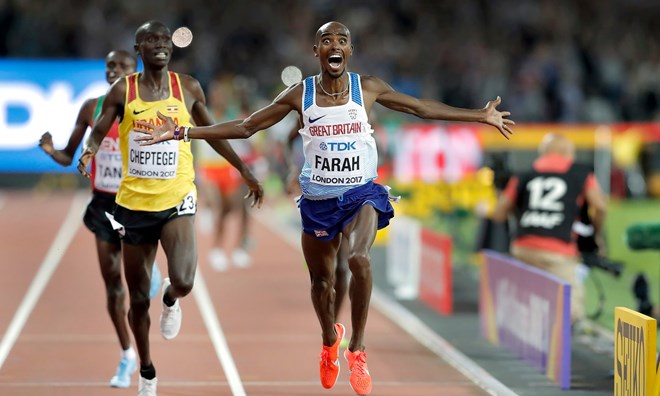
Saturday August 12, 2017
By Sean Ingle
Farah faces tough task to finish on a high at world championships
By Sean Ingle
Farah faces tough task to finish on a high at world championships

Mo Farah wins the 10,000m at the World Athletics Championships; he said his last big track race, the 5,000m, will be emotional. Photograph: Tom Jenkins for the Guardian
Whatever happens, when Mo Farah steps on to the track for the final time at a major championship on Saturday night, he will leave it knowing no British athlete has been so staggeringly successful – or had their achievements so forcibly questioned. As he put it to one interrogator last month when asked again about the continuing United States Anti-Doping Agency investigation into his coach, Alberto Salazar: “It is getting boring now.”
Winning, however, is something Farah will never grow weary of. When he surged clear to take 10,000m gold last week it was his 11th consecutive world or Olympic title, going back to 2011. That is a remarkable record – especially when you consider his global dominance began only a few months shy of his 29th birthday.
Yet the steady supply of gold medals has never made him complacent. The bookmakers make him the overwhelming favourite for the 5,000m but he sees dangers lurking everywhere, and particularly from the Ethiopian trio of Yomif Kejelcha, Muktar Edris and Selemon Barega, and from Paul Chelimo, the American who ran him close during last year’s Olympic final. “I want to leave on a high but it is going to be tough,” he said. “There are a lot more guys in the 5,000m and a lot more decisions to be made in a shorter race.
Farah admitted this last big track race will be emotional but he is careful these days not to reveal too much of himself. The persistent drizzle of accusations about Salazar and his relationship with the controversial Somali coach Jama Aden, as well as the leak of some of his athlete biological passport data by the Russian hackers Fancy Bears, have made him more watchful and less carefree – at least in public.
Those who know him well insist he is still the same athlete who once upon a time jumped off bridges for a bet and occasionally got into mischief. Certainly Farah, who was born in Somalia and moved to Britain when he was eight, has not forgotten how fortunate his journey has been.
“I think I’m a very lucky person in life,” he said. “I have a gift not many people have – to be able to know who I was and where I came from as a youngster. I don’t think there’s enough words to explain the journey and everything. But you have to appreciate what you have and do the best that I can. That’s what I was taught in my early years. To appreciate it.”
He had a simple answer when asked what – apart from hard work and luck – had kept him on top. “To be honest, it is about staying hungry, staying humble, being nice, being normal, being who you are,” he said. “No one is going to change me.”
His four Olympic gold medals were dedicated to each of his children. This one, he wants for his whole family. “They are everything to me,” he said. “I love my four kids and I love my wife. They’ve been there through ups and downs throughout my career. If I’m going to close in London I wanted them to be a part of it to celebrate with me. That’s what we do – we do everything together.”
Farah will soon have more time to spend with them. He has only two more races left on the track after London, in Birmingham next Sunday and in Zurich four days later – where he hopes to set a personal best over 5,000m – and then he will leave it all behind to become a pure road racer. According to track and field’s rumour mill a one- or two-year deal with the London Marathon is also in the pipeline, although suggestions he will leave Salazar and form a new coaching team with the UK Athletics performance director, Neil Black, and the head of endurance, Barry Fudge, have been dismissed by all parties.
In the past Farah hinted at the prospect of running in the marathon at the Tokyo Olympics. Yet given his first attempt over 26.2 miles in 2014 was a modest 2:08.21 – over a minute outside Steve Jones’s British record – there are some wise heads who would not be shocked by a return to the track in time for the 10,000m at the 2019 world championships.
That assumes, of course, his body holds up – and that he can still crank out a sub-50sec 400m in training, which is his personal barometer that he is in gold medal shape. Given he will be 36 in 2019, you would assume it would be beyond him. But, as his opponents have learned, Farah has a way of defying expectations.
No comments:
Post a Comment